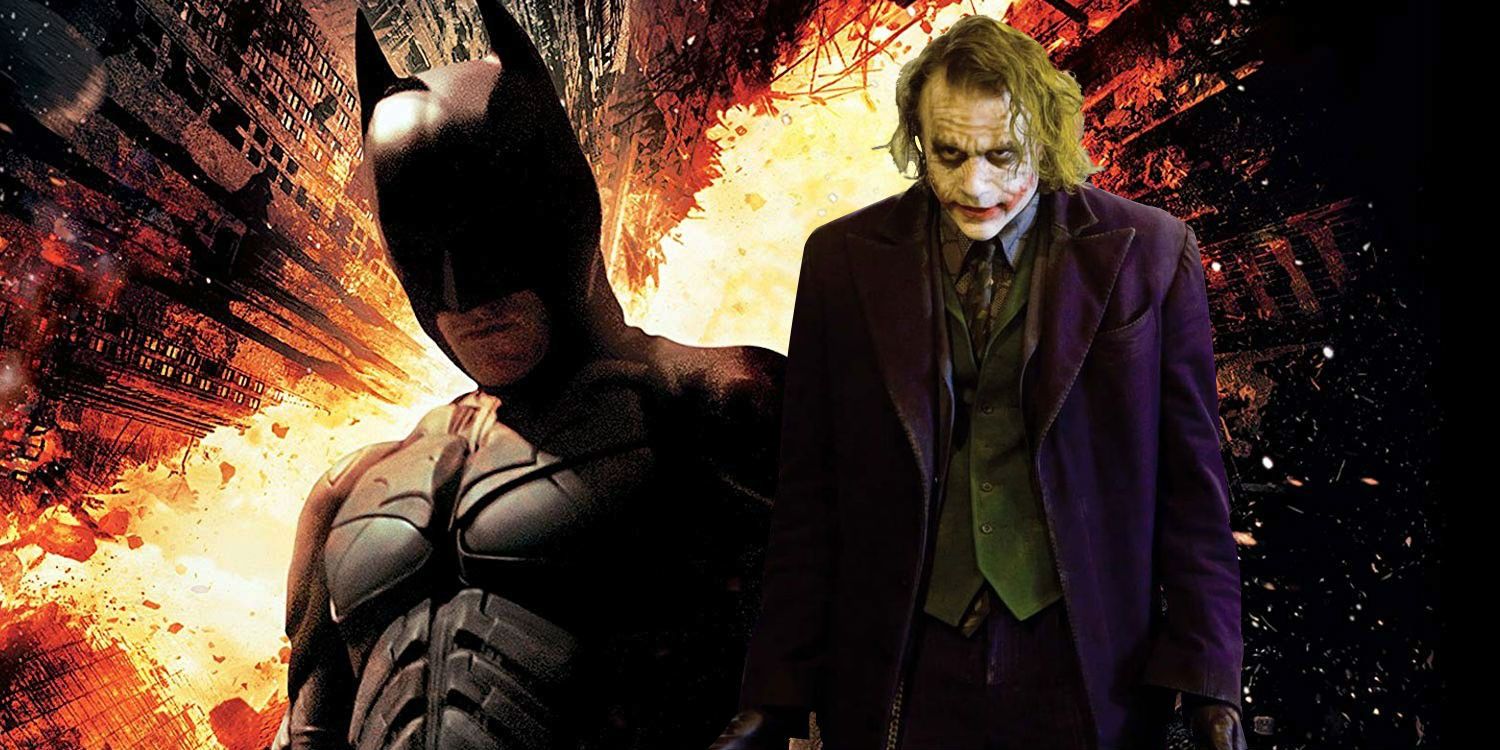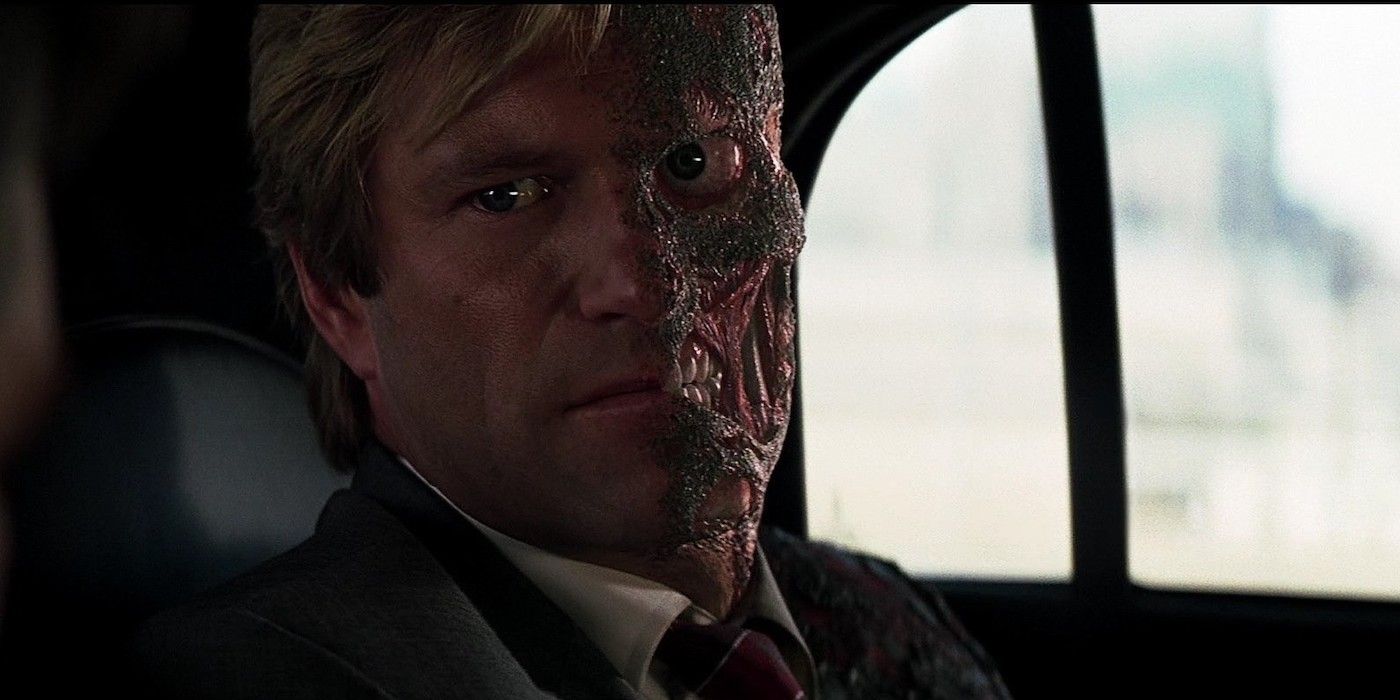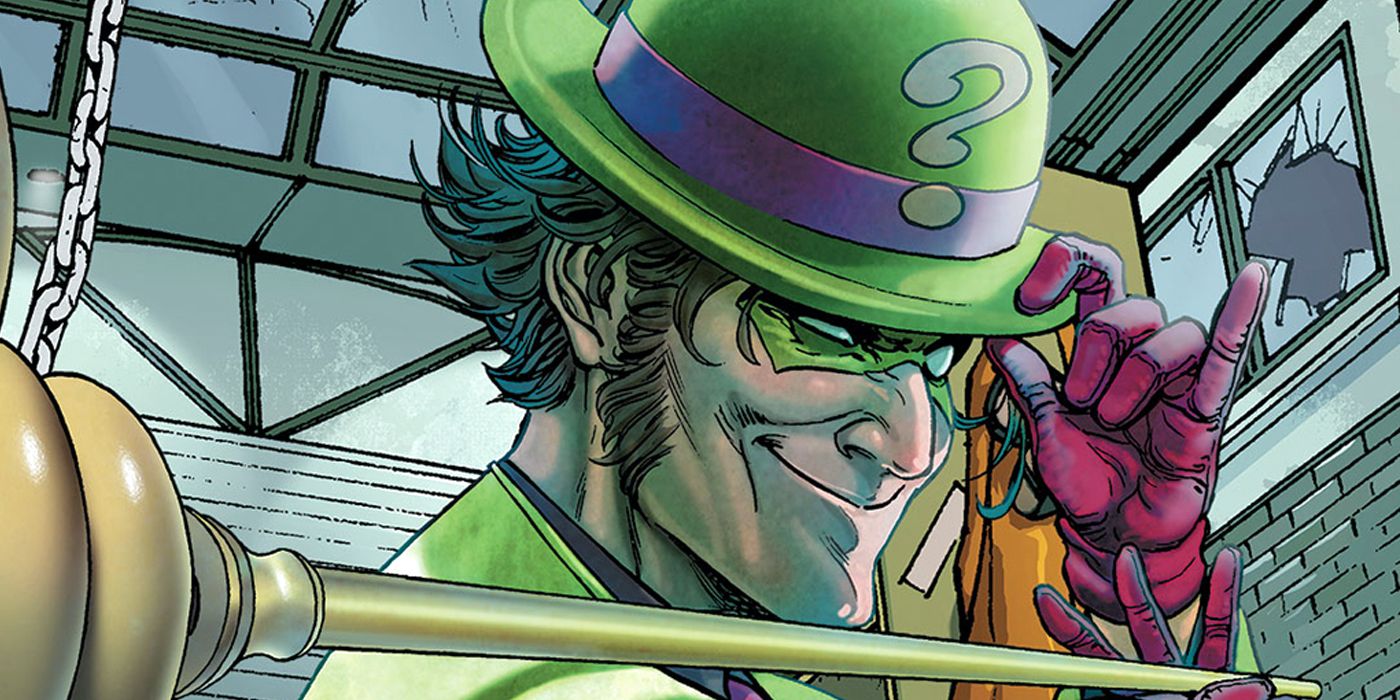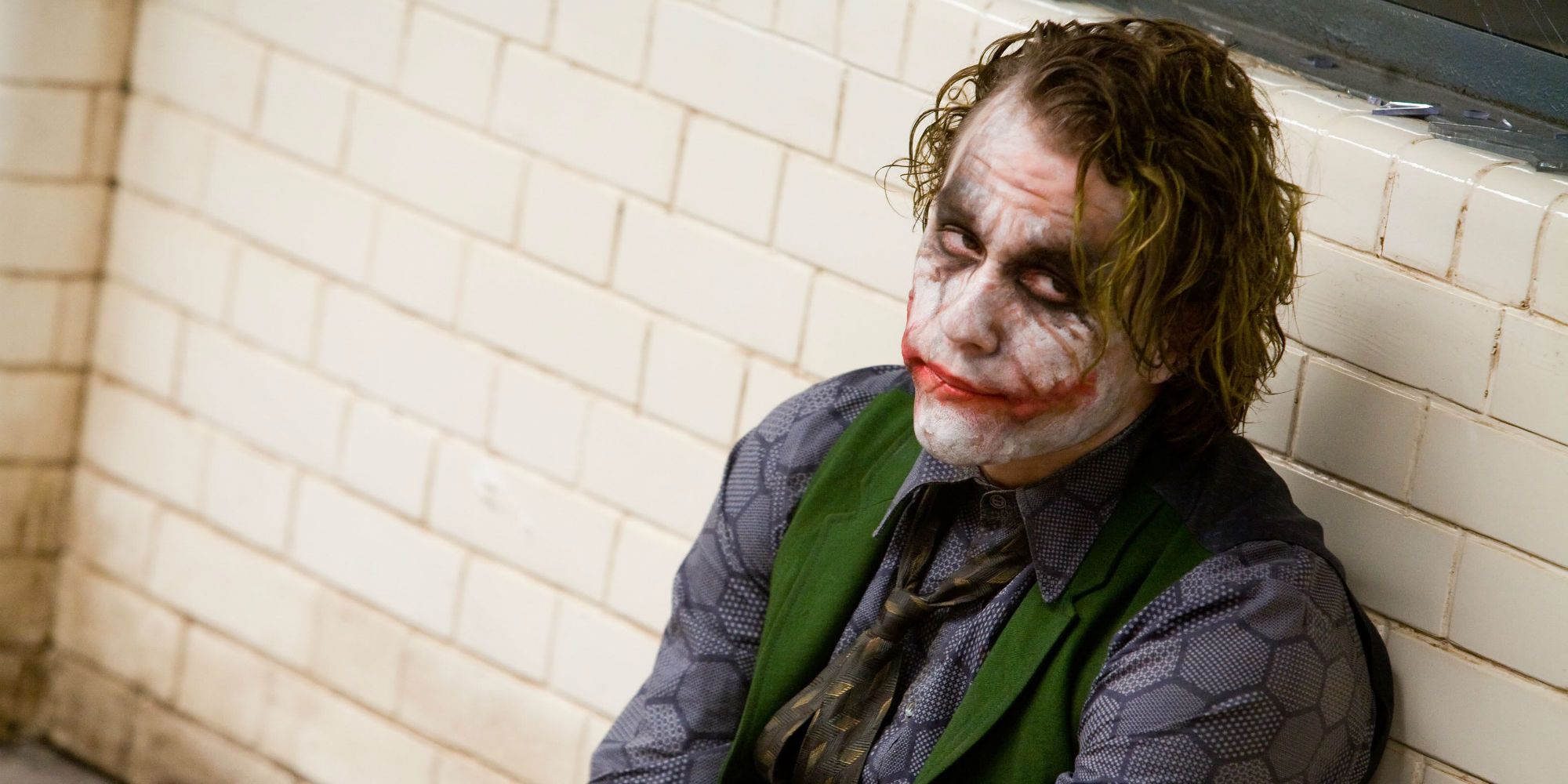How would The Dark Knight Rises have changed if the late Heath Ledger hadn't tragically passed away shortly after filming his iconic portrayal of the Joker in 2008? Widely considered the best Batman movie of all time, if not the best superhero movie of all time, The Dark Knight represents the pinnacle of Christopher Nolan's DC trilogy and his hyper-realistic urban grit approach to the Caped Crusader. Grossing over $1 billion and notching up 8 academy award nominations, The Dark Knight was instrumental in elevating the superhero genre beyond mere blockbuster action adventure fare.
A sizable chunk of The Dark Knight's success must be attributed to the appearance of Heath Ledger as Batman's most famous villain, the Joker. Working the crazed killer clown into Nolan's established tone, Ledger's performance took on a life of its own and the actor stole every scene in which he appeared. By embodying the chaotic madness of the DC comics character and adding a very believable real-world depravity, Ledger delivered a timeless performance and was awarded a richly-deserved posthumous Oscar for Best Supporting Actor.
Joker was still alive at the end of The Dark Knight, albeit finally apprehended by the Batman, and Ledger was lined up for a dramatic return in Nolan's conclusion to the trilogy, The Dark Knight Rises. Sadly, that possibility was snatched away when the actor died during the editing process of The Dark Knight and the sequel wisely embarked on an entirely new storyline, introducing Tom Hardy as Bane and revisiting the influence of Ra's al Ghul from Batman Begins. But how would The Dark Knight Rises have looked if real-life events had transpired differently and Heath Ledger's Joker had made a triumphant return?
Early Plans Had Joker Creating Two-Face In Batman 3
Even during the days of Batman Begins, writer, David S. Goyer, had a rough overview sketched out for an entire Batman trilogy, and his plans hint towards a longer arc for the Joker. In a piece published by Premiere magazine around the time the first film was released, Goyer's initial vision for his Dark Knight trilogy was revealed. By this point, of course, Batman Begins itself was already complete, and Joker had been neatly set up to appear in the sequel thanks to the final scene's now-famous playing card tease.
At this very early stage, the concept for The Dark Knight was to have Batman, Commissioner Gordon and Harvey Dent team up to bring down the Joker, with the villain being captured - but, crucially, not killed - by the film's conclusion. The main difference between this and the final script was that Dent would not transform into Two-Face midway through the story. Instead, Joker was slated to return in the third movie, on trial for his crimes in the previous installment, and would toss acid at Dent in the courtroom, giving Two-Face his comic book origin story.
Ultimately, this design was condensed. Joker still creates Two-Face, but does so indirectly through a dual explosion with Rachel Dawes in The Dark Knight, with the two popular villains then joining forces in the latter half of the film. Nolan even uses a modified version of Dent's comic backstory where the prosecutor actually avoids being scarred and is hailed for his bravery. Nevertheless, this draft does at least highlight that a two-movie arc was considered for Joker at a very early stage and that, at some point, the villain was slated to appear in the film that would eventually become The Dark Knight Rises.
Alternatively, it could be argued that the reason Nolan accelerated Goyer's Two-Face plans, moving them from Batman 3 to The Dark Knight, is that he decided not have the Joker return in the threequel even before Ledger's passing and for the performance to remain a unique single-movie experience.
What Was The Plan For The Dark Knight Sequel Before Heath Ledger's Death?
Despite having Goyer's early idea of what a three-film Batman arc might look like, Christopher Nolan has revealed in a number of interviews that he wasn't immediately keen on making a follow-up to The Dark Knight, especially after the untimely passing of Heath Ledger. In a USA Today interview, the director questioned the necessity of a third installment, and pondered how many previous cinematic sequels had genuinely lived up to the standard of their predecessors. Although Nolan obviously came around to the idea in the end, he clashed with Warner Bros. over which villain would feature.
The studio were keen on casting Leonardo DiCaprio as Riddler, likely hoping to capitalize on The Dark Knight's Joker success with an antagonist in a relatively similar vein. Nolan disagreed and wanted to head in an intentionally different direction, settling on Bane as his choice of villain. Warner Bros.' desire to follow-up Ledger's Oscar-winning performance with something similar is perhaps an indication that, had Heath Ledger lived on, his return in The Dark Knight Rises would've been an inevitability. After all, it's been almost inconceivable to have such a well-received character not feature at all in the following movie, especially while still existing somewhere within that fictional universe.
As mentioned previously, Nolan had no firm plans for a third movie while making The Dark Knight but, on Ledger's part, the actor's sister has revealed that he was incredibly proud of the performance and was hoping to return in a further offering. And even though Goyer's Harvey Dent plan had already been executed, it's clear that he too visualized a third film that did feature the Joker in some capacity.
Exactly what this capacity would be will, unfortunately, never be known. It's perhaps safe to assume, however, that Joker wouldn't have been used as a primary antagonist for a second time running, as this would fly in the face of Nolan's oft-stated desire to avoid repeating himself. It would also make no sense to relegate Ledger's Oscar-winning Joker to playing second fiddle to another baddie. Therefore, it's likely that any appearance by the Joker in Nolan's third Batman film would've been as a shadowy figure in the background - either the unseen puppet-master behind another sinister plot or an elusive ghost that haunts Bruce Wayne throughout the film.
The Joker During The Dark Knight Rises
After Heath Ledger's death, Christopher Nolan's eventual decision to return for a third Batman movie, and the director's insistence that The Dark Knight Rises utilize a very different villain to the previous film, the path for the final installment in the trilogy was set. But while it was obvious Ledger wouldn't be appearing in the film (Nolan didn't even have any wealth of deleted scenes or unused footage to draw from like Star Wars 9 does with Carrie Fisher), there remained a question mark over whether or not The Dark Knight Rises would somehow address the Joker's fate indirectly.
Ultimately, the threequel did not reference the Joker's situation in any meaningful way and in a 2012 interview with Empire, Christopher Nolan stated his reasons for doing so. The director strongly felt that leaving the Joker's story contained within The Dark Knight and not expanding upon it after Heath Ledger's passing was the right way to honor the actor and his award-winning role, and fans are left to assume the criminal remains incarcerated.
While the theatrical version of The Dark Knight Rises may have refrained from continuing Joker's story, the film's novelization did reveal a little about his post-The Dark Knight life. According to the book, the Dent Act resulted in swathes of criminals that had escaped harsher sentences by pleading insanity being moved from Arkham Asylum to Blackgate. As the only truly insane inmate, however, the Joker remained in the mental institution as its only patient, but this version of the story also opens up the possibility of the villain escaping. While certainly a deviation from Nolan's original intentions, these fresh developments work within the context of a novel that was written in the knowledge that there would not be a follow-up, and releasing the Joker back out into the streets of Gotham makes sense in context of wider Batman canon.




